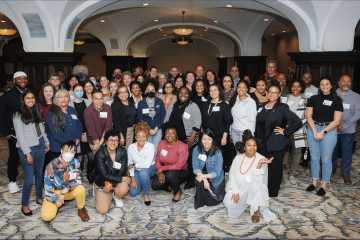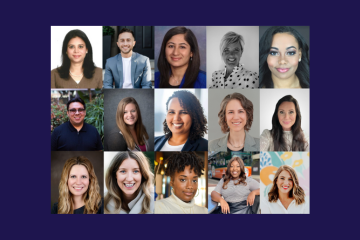
Fighting Injustice and Inequity
One nonprofit that represents public health values at work is Human Impact Partners (HIP), which, among other things, builds the capacity and leadership of the public health workforce to create healthy communities and a just society. HIP calls on public health professionals to lead and work with personal and professional values stemming from social justice. At the center of their philosophy is a dedication to communities, particularly those that are vulnerable. They imagine a public health workforce that is wholly committed to health equity and humbly centers their work on the voices of the community. HIP understands that health inequities result from lack of access to basic social and physical needs, which stem from power imbalances and forms of oppression, like racism. All of their work is inspired by this understanding. For example, they host webinars that instruct health department workers in health equity practice and how to engage with communities to build power.
I had the opportunity to speak with Jonathan Heller, one of HIP’s co-directors, who told me that the country needs people who are willing to put communities first and not compromise our values of social justice. When I asked Heller if there are any drawbacks to fighting for health equity in areas where people might not be ready to listen, he responded, “If not us, then who? If not now, then when?” This response speaks to the real and human consequences to health inequity. If public health wants to be a field that truly serves communities, we must act urgently to lessen the loss of life and livelihood caused by health inequality. Talking with Jonathan reminded me why I chose to study public health in the first place, after witnessing the destructive impact of the inequalities in health, education, and housing on families in St. Louis where I studied. HIP projects a vision of the kind of public health worker I want to be: one who focuses on the people I serve, prioritizes health equity, and leads with my values.
The Six Moral Foundations
Early on during my time at the de Beaumont Foundation, I met a group of public health lawyers, a health director, and a health system chaplain from North Carolina when they presented at a meeting of deputy state health officials. Their framework, “Crafting Richer Messages: Advocacy for Public Health Leaders,” represents another way of conceptualizing public health values and their role in public health practice.
The group’s work stemmed from the six moral foundations described by Jonathan Haidt in his book The Righteous Mind: Why Good People are Divided by Politics and Religion. The powerful revelation in Haidt’s research was that liberal-minded folks communicate primarily in the moral foundations of fairness, care, and liberty, while conservative communication tends to encompass the whole spectrum of the six moral foundations. This could explain the disconnect public health workers face when communicating public health work to conservative leaders; we forget to use the full spectrum of values. In this context, the “Crafting Richer Messages” framework presents an inclusive way for public health workers to work with partners of all political and ideological stripes, in order to find common ground and meet the shared goal of improving population health.
This operationalizing of moral foundations played out in a public health agency when Sue Lynn Ledford, the Wake County Health Director, helped pass 2016 legislation for a needle exchange program in North Carolina – in a heavily conservative General Assembly – in partnership with the NC Harm Reduction Coalition and the state law enforcement community. Together, these partners used persuasive arguments based on respect for law enforcement (authority) as well as appealing to the compassion for communities and families (care, loyalty, sanctity). Ledford listened to the values of lawmakers and communicated her position with moral foundations across the liberal/conservative spectrum, ultimately establishing a life-saving and highly controversial policy.
This work and the “Crafting Richer Messages” framework taught me that working across aisles, differences, sectors, and backgrounds is not a compromise of public health values, but an extension of them. As a public health worker, I will strive to speak many moral languages, so I can be an effective advocate for population health strategies.
Embracing the Spectrum of Approaches
The Human Impact Partners point due north, reminding the field of our highest ideals and greatest commitments. The “Crafting Richer Messages” initiative teaches us how to work inclusively with those we might not naturally agree with to make progress and improve lives. I see this spectrum of approaches to public health as an asset to the public health workforce, allowing us to solve problems from a variety of perspectives and with a variety of partners. As a result, I believe I can both stretch myself to communicate in all of the moral foundations, while still prioritizing the communities I serve.
What these approaches have in common is that they highlight the necessity of being a good partner in communities and engaging all the people we serve with humility and integrity. I still don’t know exactly where I fit in in the spectrum of these approaches, but asking these big questions about the public health field and workforce helps me imagine more possibilities and paths. When I consider what type of public health career I want to build, I know to look for opportunities that enable me to uphold my deeply held values, communicate in many moral languages, and partner with everyone committed to making a difference for the health of the public.




